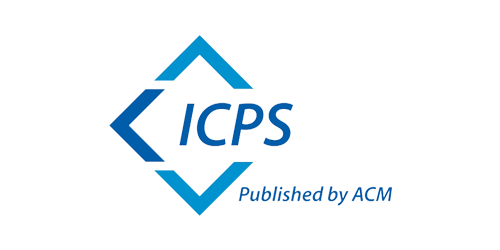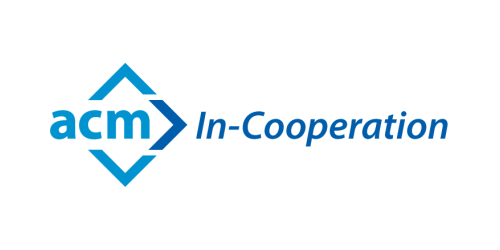Submission
Submission is closed.Submission closes June 1st, 24h in UTC+2 time zone.
Camera-ready papers
Please finish your camera-ready papers until 31st July, 2020.
This will require the following steps:
Revise your paper
Please improve your paper taking into account the scientific and editorial corrections/suggestions you have received from reviewers.
Please take the responsibility for a final spell check and language-style correction before submitting your camera-ready paper.
Make sure that you stay within the maximum page limit for your category (short/long paper). See Call for Papers.
Please adhere to the in-text citation style and reference format guidelines provided by the ACM. If you do not, your paper will be returned to you for proper formatting.
Also make sure that you are using the correct template. See Call for Papers. Set up the ACM template in camera-ready mode (as opposed to review mode which generates line numbers, or author version mode).
Please import the required indexing concepts for your article from the ACM Computing Classification System (CCS). You can use the following web-based indexing support tool which generates the necessary TeX/XML code once you have selected your terms to insert in your LaTeX/Word templates.
Update metadata in EasyChair
Update abstract, authors and title in EasyChair if something has changed.
Optional upload of supplementary data
Zenodo.org offers free permanent storage of research data with permanent digital object identifiers (DOIs). It is perfectly suited to refer to supplementary material from within your camera-ready paper, therefore recommended by AM'20.
If you you have any research data that is coupled to your publication (e.g., data sets, appendices, source code, GitHub repositories, etc.), you can upload it there and include the DOI in your paper.
The procedure is as follows:
- go to https://zenodo.org/communities/audiomostly/
- click the "New Upload" button
- log in with GitHub, ORCID, or Zenodo account
- enter meta-data and upload data
- you obtain a DOI
- cite your data properly via DOI within your paper
- we will be notified and accept your upload to appear under https://zenodo.org/communities/audiomostly/
Copyright notice
The ACM will send accepted authors a copyright form and complete instructions. A weekly reminder will be sent to authors with outstanding forms. After completing the rights management form, the ACM will email authors a copy of the form and the correct rights management and bibliographic information text to add to their paper (incl. ISBN, DOI).
For those who are not yet familiar with this process, we prepared a guide: AM20_acm_copyright_instructions.pdf
Upload files to EasyChair
Paper:
Update the pdf of the final paper.
Source:
Upload the source of your paper in the form of LaTeX code (.zip) or a Word document (.docx). In case of LaTeX, please create a self-contained folder, packed as one zip-archive, including all figures and other files that are necessary to compile it.
Optional image for the ACM digital library:
ACM invites authors to submit an image representation of their article. The image must be selected from the article body and can be any of the following: art, graphic, table, figures, etc. (Image files are to be as square as possible, 100x100 ppi and in .jpg format.)
Authors must supply a caption with the image. The caption length should be no more than 512 characters. (Caption should be a separate textfile in .txt format.)
Pack image and caption as a zip-archive and upload it here.
Broadcast-ready presentations
All presenters are asked to provide the following files, until 1st September, 2020:
- broadcast-ready video presentations and/or a virtual poster
- a photo of yourself to appear on the conference website (if you are ok with that)
If you want to share a link (e.g., to a project website) to appear besides your video/poster, please write us an email.
Upload your files here: https://cloud.iem.at/index.php/s/W7oPWZbkCcCfd9Z
Please name the files in a descriptive manner (e.v., "117_presentation_video.mp4" or "117_supplementary_material.zip"), always starting with your EasyChair submission number.
Oral presentations:
Oral presentations have to be submitted as a pre-produced video of 10-15 minutes. The video will be made available via on-demand stream (hosted on vimeo), and also via broadcast that is timed with the conference schedule.
We require your active participation as a panelist within the Q&A session that is scheduled as a plenary video conference at the end of the session your paper appears in. This Q&A session will be moderated and gives you the opportunity to receive live questions or address questions raised in the online chat.
Poster and demo presentations:
Posters and Demos require to submit a teaser video of 1-3 minutes as well as a virtual poster. Each poster/demo will be given its own interactive video conferencing session during AM'20. Posters are not limited to any specific format or template, if they are submitted as a one-page pdf file. They will be integrated in the webpage as download link and/or web page. You may also submit a small static html page instead. Please get in touch with us if you have special requirements.
Software:
We recommend the open-source and cross-platform sofware OBS Studio for recording your video presentations. It allows you to record your screen (slides, demo, etc.) and webcam (you) at the same time.
If you are familiar with DAWs, you might want to produce your video presentation using Reaper. Find tutorials here: https://reaperblog.net/course/reaperblog-video-tools/
For instance, you can export your slides as images and drag them into a Reaper project as video item. Reaper allows you to modify the item/video length with the mouse. You can record your voice over the slides and render the video under File->Render...->Output format->Video(ffmpeg) using webm/VP8 or QT/MOV/MP4/H264 if you use additionals as described in https://youtu.be/m5eWDeftza4.
Video file format:
We will host the video presentations on vimeo which generally accepts almost any format. However, for optimal quality, we recommend the following settings, in line with the vimeo compression guidelines:
Resolution: at least 720p HD video (1280x720), 16:9 aspect ratio. We prefer 1080p (1920x1080).
Video format: h264 codec, mp4 container (file ending: ".mp4").
Audio format: stereo, AAC-LC codec, 320kbit/s, 48kHz.
Branding and titles:
We will add a small intro and outro to each video, to ensure a consistent branding for AM'20. No information on authors or title will be added.




